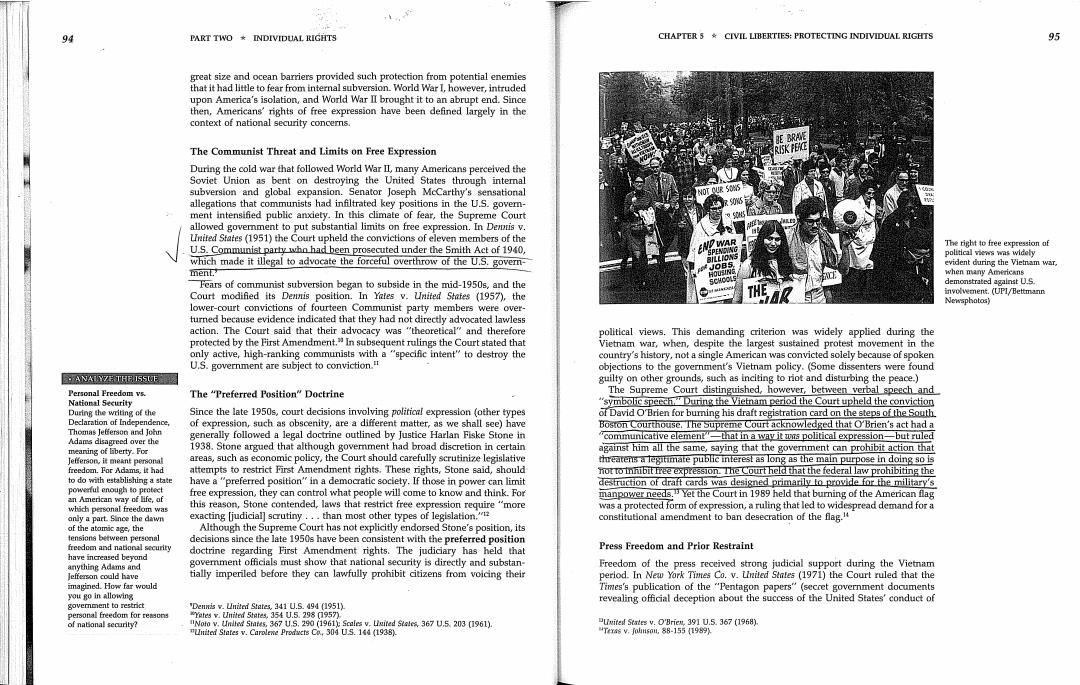正在加载图片...

94 PART TWO INDIVIDUAL RIGHTS CHAPTER 5 CIVIL LIBERTIES:PROTECTING INDIVIDUAL RIGHTS 95 great size and ocean barriers provided such protection from potential enemies that it had little to fear from internal subversion.World War I,however,intruded upon America's isolation,and World War II brought it to an abrupt end.Since then,Americans'rights of free expression have been defined largely in the context of national security concerns. The Communist Threat and Limits on Free Expression During the cold war that followed Worid War II,many Americans perceived the Soviet Union as bent on destroying the United States through intemal subversion and global expansion.Senator Joseph McCarthy's sensational allegations that communists had infiltrated key positions in the U.S.govem- ment intensified public anxiety.In this climate of fear,the Supreme Court allowed government to put substantial limits on free expression.In Demris v. United States (1951)the Court upheld the convictions of eleven members of the U.S.Communist party who had been prosecuted under the Smith Act of 1940, The right to free expression of polltcal vews was widoly which made it illegal to advocate the foreeful overthrow of the U.S.govern- evident during the Vietnam war, ment. when many Americans Fears of communist subversion began to subside in the mid-1950s,and the Court modified its Dennis position.In Yates v.United Stafes (1957),the emnent.(UPI/Bettman lower-court convictions of fourteen Communist party members were over- turned because evidence indicated that they had not directly advocated lawless action.The Court said that their advocacy was "theoretical"and therefore political views.This demanding criterion was widely applied during the protected by the First Amendment."In subsequent rulings the Court stated that Vietnam war,when,despite the largest sustained protest movement in the only active,high-ranking communists with a "specific intent"to destroy the country's history,not a single American was convicted solely because of spoken U.S.government are subject to conviction. objections to the government's Vietnam policy.(Some dissenters were found ANALY7ETH155E☒ guilty on other grounds,such as inciting to riot and disturbing the peace.) Personal Freedom vs. The "Preferred Position"Doctrine The Supreme Court distinguished,however,between verbal speech_and National security symbolic speech,"During the Vietnam period the Court upheld the conviction ng of the Since the late 190s,oourt decisions involving politic expression (other types of David Orien for buming his draft registration card on the steps of the South of Independence, of expression,such as obscenity,are a different matter,as we shall see)have Boston Courthouse.The Supreme Court acknowledged that CBrien's act had a Thomas Jefferson and John generally followed a legal doctrine outlined by Justice Harlan Fiske Stone in communicative elementthat in a way it wms political expression-but ruled Adams disagreed over the meaning of Eberty.For 1938.Stone argued that although govemment had broad discretion in certain gainst him all the same,saying that the government can prohibit action that ef任Prson.i话neant persona areas,such as economic policy,the Court should carefully scrutinize legislative threaters a fegitimate public interest as long as the main purpose in doing so is freedom.For Adams.It had attempts to restrict First Amendment rights.These rights,Stone said,should not to innibit free expression.The Court held that the federal law prohibiting the have a "preferred position"in a democratic society.If those in power can limit destruction of draft cards was designed primarily to provide for the military's free expression,they can control what people will come to know and think.For manpower needs.Yet the Court in 1989 held that burning of the American flag which personal freedom was this reason,Stone contended,laws that restrict free expression require"more was a protected form of expression,a ruling that led to widespread demand for a anly a part Since the dawn exacting [judicial]scrutiny...than most other types of legislation." constitutional amendment to ban desecration of the flag. of the atomic age,the Although the Supreme Court has not explicitly endorsed Stone's position,its n and natio decisions since the late 1950s have been consistent with the preferred position Press Freedom and Prior Restraint have doctrine regarding First Amendment rights.The judiciary has held that anything Adams and govemment officials must show that national security is directly and substan- Freedom of the press received strong judicial support during the Vietnam lefferson could have tially imperiled before they can lawfully prohibit citizens from voicing their period.In New York Timtes Co.v.Uinited Stntes (1971)the Court ruled that the imagined.How far would Times's publication of the "Pentagon papers"(seccet government documents you go in allowing government to restrict revealing official deception about the success of the United States'conduct of onal freedom for rea 354U.5.298195 No.e..90 (367 U.03 (1961) o85w7a96